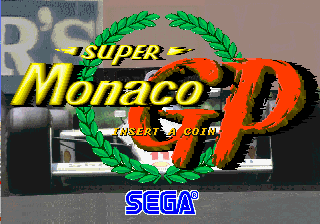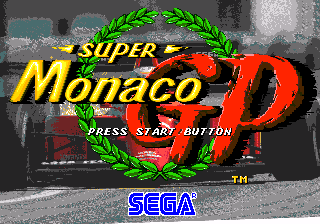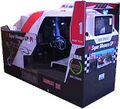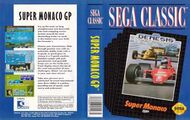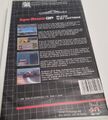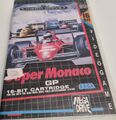- For the Sega Master System and Sega Game Gear versions, see Super Monaco GP (8-bit).
Super Monaco GP (スーパーモナコGP) is a 1989 arcade racing game by Sega Enterprises, Ltd. It is the sequel to Monaco GP, but rather than being a top-down racer it has a first person view. It was originally released for the Sega X Board arcade system.
Gameplay
Super Monaco GP is a Formula One racing game played from a first person perspective, where the objective is to race against other F1 cars around a track in an attempt to reach first place. The game lacks any official licensing from any manufacturers or drivers, though continues to take many design cues from what was happening in the sport in the late 1980s (one exception is the "Sega SG1000 V8" engine, which is named after the Sega SG-1000 video game console).
Despite its name, the arcade Super Monaco GP does not feature any variant of the Circuit de Monaco, (i.e. the "Monaco GP"), instead opting for an original track layout with elements inspired by the famous race course. Also, typical for the era, the game takes a more arcade-style approach, scrapping many of the rules and regulations of the sport and being far more lenient with the physics of the cars.
Flicky is referenced in track advertisements, with the eponymous bird having a cameo at the end of races.
Courses
|
|
San Marino
|
|
|
|
|
Brazil
|
|
|
|
|
France
|
|
|
|
|
Hungary
|
|
|
|
|
West Germany
|
|
|
|
|
U.S.A.
|
|
|
|
|
Canada
|
|
|
|
|
Great Britain
|
|
|
|
|
Italy
|
|
|
|
|
Portugal
|
|
|
|
|
Spain
|
|
|
|
|
Mexico
|
|
|
|
|
Japan
|
|
|
|
|
Belgium
|
|
|
|
|
Australia
|
|
|
|
|
Monaco
|
|
|
History
Release
Despite its outward appearance, Super Monaco GP did not acquire any Formula One-related licenses or sponsorship deals during production. Cabinet designs and marketing material greatly emphasise the orange and white stylings of team Marlboro McLaren Honda's McLaren MP4/4, one of the dominant cars in Formula One during the late 1980s (driven by Ayrton Senna, who would feature in the game's successor, Ayrton Senna's Super Monaco GP II). Later releases add a touch of blue to the cabinet to create a more unique look.
Sega was sued by Philip Morris in the US due to the unauthorised Marlboro cigarette advertisements in the game. An initial complaint was filed when one of Philip Morris's lawyers spotted branding while visiting an arcade in November 1989. The firm demanded that Sega removed what it saw as trademark infringement immediately, citing also that it did not want to be seen advertising to minors. Sega conceded immediately and began the process of removing the advertisements from the game.
Co-chairman of Sega David Rosen issued a statement shortly claiming that the inclusion of "fleeting billboard parodies" was an "innocent attempt to mimic real-life locations and scenery to enhance the realism of game play"[13]. It had been claimed that the in-game banners were sponsored by Philip Morris, something both companies denied. The Marlboro advertisements were also criticised by the US Federal Trade Commission as many arcade users at the time were children[14]
Sega was not alone in plagerising cigarette companies at the time, with Jaleco, Namco and Konami also featuring similar advertisements in their racing games. Sega's own Hang-On had featured "Marbor" advertisements back in 1985, with general council of Sega Kiichi Nishikura citing that the practise was legal under Japanese copyright law. Nishikura's response to anti-smoking group complaints was to pass the blame to US tobacco companies advertising on Japanese television, suggesting also that the billboards scroll by so fast that he didn't think it would have a "serious subconscious effect".
Sega completed the changes and began issuing free conversion kits in March 1990[15], plus a $200 cheque to entice arcade operators into making the change. However takeup was not good enough for Philip Morris, who sued in February 1991 when it emerged many older cabinets were still in active service. By May 1992 the two companies had reached an agreement. Sega would also distance itself from plagerising official Formula One cars and sponsors in the home ports of the game.
Legacy
Super Monaco GP was ported to the Amiga, Amstrad CPC, Atari ST, Commodore 64, Sega Mega Drive and ZX Spectrum.
Super Monaco GP was followed by Ayrton Senna's Super Monaco GP II which built upon the previous game.
Versions
Mega Drive version
On the Mega Drive, Super Monaco GP is a much larger game than its arcade counterpart thanks to its highly received "World Championship Mode", in which all sixteen tracks from the 1989 Formula One season are included (albeit far less detailed than the X Board arcade version due to the limitations of the Mega Drive's hardware).
Likewise, sixteen one-driver teams are included, though as with all versions of the game, the names are fictional due to a lack of an official FIA license.
This version of the game has since been included in numerous compilations.
The Japanese release was the first Mega Drive game to be software incompatible with PAL consoles.[16]
Commodore 64 version
The Commodore 64 version of Super Monaco GP builds on the engine developers Probe Software used for their earlier C64 racing conversion of Special Criminal Investigation. Programmer Grant Harrison stated that having a first person perspective actually made the game run faster, as fewer calculations were needed to draw the road ahead[17].
Sprite limitations are a problem for the Commodore 64 version of the game, so if an opponent car gets too close to the player (and thus needs a bigger sprite), any other on-screen cars will speed up so that they are not rendered on-screen[18].
As the team only had access to a video of the game (and Harrison had only played the arcade once), the Mega Drive version was used as a reference[18]. A cartridge version was "discussed" but never made it to market[18].
Production credits
- Main article: Super Monaco GP/Production credits.
Magazine articles
- Main article: Super Monaco GP/Magazine articles.
Promotional material
- Main article: Super Monaco GP/Promotional material.
Photo gallery
Physical scans
X Board version
| {{{{{icon}}}|L}}
|
Division by zero.
|
Based on
0 review
|
| X Board, US
|
|
|
 Manual |
| X Board, World (sit-down)
|
|
|
|
|
X Board, World
(sit-down; 2-player)
|
|
|
|
|
Mega Drive version
| {{{{{icon}}}|L}}
|
Division by zero.
|
Based on
0 review
|
| Mega Drive, JP
|
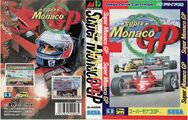 Cover
|
|
|
| Mega Drive, US
|
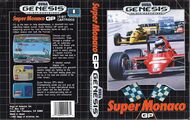 Cover
|
|
|
| Mega Drive, EU
|
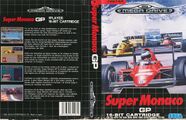 Cover
|
|
|
| Mega Drive, IT (NTSC Import)
|
|
|
|
|
| Mega Drive, PT
|
 Cover
|
 Cart  Manual |
| Mega Drive, SE (rental; Hent; black)
|
|
|
|
|
| Mega Drive, FI
|
 Cover
|
 Cart  Manual |
| Mega Drive, AU (Horizontal manual)
|
|
|
|
|
| Mega Drive, AU (Vertical manual)
|
|
|
|
|
| Mega Drive, BR
|
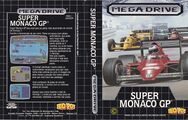 Cover
|
 Cart  Manual |
| Mega Drive, BR (Cardboard Box))
|
|
|
|
|
| Mega Drive, BR (Red Box)
|
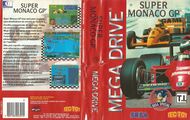 Cover
|
 Cart |
| Mega Drive, CA
|
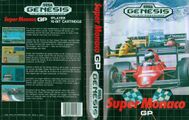 Cover
|
|
|
Mega-Tech version
| Mega-Tech,
|
 Cover
|
|
|
Amiga version
| Amiga, UK
|
 Cover
|
 Disk |
| Amiga, UK (Kixx)
|
|
|
 Disk  Manual (Front)  Manual (Back) |
Amstrad CPC version
| {{{{{icon}}}|L}}
|
Division by zero.
|
Based on
0 review
|
| Amstrad CPC, UK (cassette)
|
|
|
|
|
| Amstrad CPC, UK (disk)
|
|
|
 Disk |
| Amstrad CPC, UK (cassette; Kixx)
|
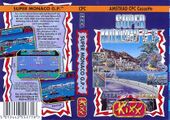 Cover
|
 Cassette |
| Amstrad CPC, ES (cassette)
|
|
|
 Cassette |
Atari ST version
Commodore 64 version
| {{{{{icon}}}|L}}
|
Division by zero.
|
Based on
0 review
|
| Commodore 64, UK (cassette)
|
|
|
 Cassette |
| Commodore 64, UK (cassette; Kixx)
|
 Cover
|
|
|
| Commodore 64, UK (disk; Kixx)
|
|
|
 Disk |
ZX Spectrum version
| {{{{{icon}}}|L}}
|
Division by zero.
|
Based on
0 review
|
| ZX Spectrum, UK
|
|
|
 Cassette |
| ZX Spectrum, UK (Kixx)
|
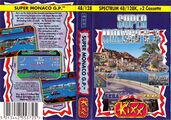 Cover
|
|
|
Technical information
- Main article: Super Monaco GP/Technical information.
ROM dump status
| System |
Hash |
Size |
Build Date |
Source |
Comments |
|
|
|
| ?
|
|
3720kB
|
|
|
|
|
|
|
| ✔
|
| CRC32
|
90f9bab3
|
| MD5
|
c53dbf0f7172556d08a37cc590bddf8a
|
| SHA-1
|
631b72e27b394ae6b5a1188dfa980333fc675379
|
|
512kB
|
1990-06
|
Cartridge
|
Revision 00
|
|
|
|
| ✔
|
| CRC32
|
b1823595
|
| MD5
|
ded2b235f625424f353c13c4d3a2cf89
|
| SHA-1
|
ed6f80546a7847bf06cf4a62b34d1c3b989e4d3e
|
|
512kB
|
1990-06
|
Cartridge
|
Revision 01
|
|
|
|
| ✔
|
| CRC32
|
be91b28a
|
| MD5
|
7c343c0b33f8af9f4719ead8cee7b201
|
| SHA-1
|
1e49a449367f0ec7ba0331b7b0d074f796e48d58
|
|
512kB
|
1990-06
|
Cartridge
|
Revision 02
|
|
|
|
| ✔
|
| CRC32
|
725018ee
|
| MD5
|
0948aa1acc9f21a966b052a8ee385884
|
| SHA-1
|
1947d41598daa3880ecb826303abae2accd1857f
|
|
512kB
|
1990-06
|
Cartridge (US)
|
Revision 03
|
|
|
|
Specifications
Dimensions
| Deluxe
|
Cockpit
|
Upright
|
1.07 m (42.126") 1.55 m (61.024") 2.16 m (85.039")
|
850 mm (33.465") 1.5 m (59.055") 1.89 m (74.409")
|
630 mm (24.803") 1.85 m (72.835") 1.02 m (40.157")
|
| Mass: 350 kg (770 lbs)
|
Mass: 150 kg (330 lbs)
|
Mass: 130 kg (286 lbs)
|
External links
References
- ↑ File:Super Monaco GP MD JP Box.jpg
- ↑ 2.0 2.1 https://sega.jp/history/hard/megadrive/software.html (Wayback Machine: 2020-07-20 09:51)
- ↑ https://sega.jp/history/arcade/product/12086/
- ↑ https://archive.org/details/ArcadeGameList1971-2005/page/n132/mode/1up
- ↑ 5.0 5.1 Electronic Gaming Monthly, "November 1990" (US; 1990-xx-xx), page 19
- ↑ https://groups.google.com/g/rec.games.video/c/6fqJm4Vn0ro/m/JxlwssaoxTYJ
- ↑ 7.0 7.1 Press release: 1997-06-19: BACK BY POPULAR DEMAND -- SEGA RELAUNCHES GENESIS GAMES AT VALUE PRICES
- ↑ Sega Channel schedule (US; 1994-06-01)
- ↑ 9.0 9.1 Mean Machines, "December 1990" (UK; 1990-12-xx), page 56
- ↑ File:LiverpoolEcho UK 1990-12-31 18.jpg
- ↑ Sega Power, "March 1991" (UK; 1991-02-07), page 25
- ↑ 12.0 12.1 12.2 12.3 12.4 12.5 12.6 12.7 ACE, "April 1991" (UK; 1991-03-08), page 69
- ↑ File:SuperMonacoGP US Statement 1990-01-12.png
- ↑ ACE, "April 1991" (UK; 1991-03-08), page 8
- ↑ File:SuperMonacoGP US Letter ConversionKit 1990-03-15.pdf
- ↑ Popular Computing Weekly, "August 23-August 29 1990" (UK; 1990-08-23), page 2
- ↑ Zzap!64, "January 1991" (UK; 199x-xx-xx), page 82
- ↑ 18.0 18.1 18.2 Zzap!64, "January 1991" (UK; 199x-xx-xx), page 83
- ↑ ACE, "October 1989" (UK; 1989-09-07), page 22
- ↑ Commodore User, "August 1989" (UK; 1989-07-26), page 88
- ↑ Computer & Video Games, "September 1989" (UK; 1989-08-16), page 85
- ↑ Sinclair User, "August 1989" (UK; 1989-07-18), page 75
- ↑ 1700 igr dlya Sega, "" (RU; 2001-xx-xx), page 133
- ↑ ACE, "November 1990" (UK; 1990-10-xx), page 91
- ↑ Aktueller Software Markt, "November 1990" (DE; 1990-10-26), page 141
- ↑ Beep! MegaDrive, "September 1990" (JP; 1990-08-XX), page 24
- ↑ Buzz! Computers (UK) (+0:00)
- ↑ Complete Guide to Consoles, "Volume IV" (UK; 1990-11-xx), page 36
- ↑ The Complete Guide to Sega, "" (UK; 1991-05-xx), page 50
- ↑ Console XS, "June/July 1992" (UK; 1992-04-23), page 134
- ↑ Cool Gamer, "9" (RU; 2002-10-13), page 212
- ↑ Computer & Video Games, "October 1990" (UK; 1990-09-16), page 114
- ↑ Mean Machines: The Essential Sega Guide, "" (UK; 1993-11-18), page 101
- ↑ Famitsu, "" (JP; 1990-xx-xx), page 1
- ↑ Games-X, "Sneak Preview March 1991" (UK; 1991-0x-xx), page 17
- ↑ Famicom Hisshoubon, "1990-16, 17 (1990-09-14, 09-03)" (JP; 1990-08-03), page 18
- ↑ Hobby Consolas, "Diciembre 1991" (ES; 1991-1x-xx), page 82
- ↑ Joystick, "Octobre 1990" (FR; 1990-xx-xx), page 110
- ↑ Sega Mega Drive Advanced Gaming, "January 1993" (UK; 199x-xx-xx), page 94
- ↑ Mega Drive Fan, "November 1990" (JP; 1990-10-08), page 63
- ↑ Mega, "June 1994" (UK; 1994-05-19), page 65
- ↑ Mega Action, "October 1993" (UK; 1993-09-09), page 64
- ↑ Mega Play, "November/December 1990" (US; 1990-xx-xx), page 30
- ↑ MegaTech, "Xmas 1991" (UK; 1991-12-06), page 80
- ↑ MegaTech, "February 1992" (UK; 1992-01-20), page 39
- ↑ Micromanía (segunda época), "Marzo 1991" (ES; 1991-0x-xx), page 38
- ↑ Mean Machines, "December 1990" (UK; 1990-12-xx), page 54
- ↑ Mean Machines Sega, "October 1992" (UK; 1992-09-xx), page 127
- ↑ Player One, "Janvier 1991" (FR; 199x-xx-xx), page 30
- ↑ Power Play, "11/90" (DE; 1990-10-12), page 139
- ↑ Raze, "November 1990" (UK; 1990-09-27), page 62
- ↑ Sega Power, "March 1991" (UK; 1991-02-07), page 24
- ↑ Sega Power, "October 1991" (UK; 1991-09-05), page 54
- ↑ Sega Pro, "April 1992" (UK; 1992-03-19), page 30
- ↑ Sega Pro, "April 1993" (UK; 1993-03-11), page 68
- ↑ Sega Saturn Magazine, "September 1995" (JP; 1995-08-08), page 85
- ↑ 57.0 57.1 57.2 Tilt, "Décembre 1991" (FR; 1991-1x-xx), page 64
- ↑ Tricks 16 bit, "Tricks Sega Gold 800 igr" (RU; 1998-03-20), page 191
- ↑ Zero, "November 1990" (UK; 1990-1x-xx), page 90
- ↑ ACE, "April 1991" (UK; 1991-03-08), page 68
- ↑ Amiga Force, "Autumn/Winter 1992" (UK; 1992-xx-xx), page 16
- ↑ Amiga Format, "April 1991" (UK; 1991-03-14), page 58
- ↑ Amiga Format, "November 1992" (UK; 1992-10-08), page 110
- ↑ Amiga Joker, "April '91" (DE; 1991-03-28), page 61
- ↑ Amiga Power, "May 1991" (UK; 1991-xx-xx), page 91
- ↑ Aktueller Software Markt, "Juni 1991" (DE; 1991-05-31), page 55
- ↑ Amiga User International, "Volume 5, Number 6: June 1991" (UK; 1991-0x-xx), page 77
- ↑ CU Amiga, "March 1991" (UK; 1991-02-xx), page 48
- ↑ 69.0 69.1 Computer & Video Games, "March 1991" (UK; 1991-02-16), page 24
- ↑ The Games Machine, "Aprile 1991" (IT; 1991-0x-xx), page 32
- ↑ 71.0 71.1 Joystick, "Avril 1991" (FR; 1991-0x-xx), page 162
- ↑ 72.0 72.1 The One, "April 1991" (UK; 1991-03-28), page 72
- ↑ Power Play, "5/91" (DE; 1991-04-12), page 39
- ↑ Raze, "April 1991" (UK; 1991-02-28), page 28
- ↑ Svet Kompjutera, "Jun 1991" (YU; 1991-xx-xx), page 75
- ↑ Tilt, "Mai 1991" (FR; 1991-0x-xx), page 81
- ↑ User, "Ioúlios-Ávgoustos 1991" (GR; 1991-0x-xx), page 56
- ↑ 78.0 78.1 Zero, "March 1991" (UK; 1991-0x-xx), page 36
- ↑ 79.0 79.1 Zzap!64, "March 1991" (UK; 1991-xx-xx), page 8
- ↑ 64'er, "September 1991" (DE; 1991-08-xx), page 99
- ↑ Commodore Force, "August 1993" (UK; 1993-06-24), page 21
- ↑ Commodore Format, "April 1991" (UK; 1991-03-21), page 60
- ↑ Commodore Format, "December 1992" (UK; 1992-11-15), page 28
- ↑ Your Commodore, "March 1991" (UK; 1991-02-22), page 12
- ↑ Zzap!, "Marzo 1991" (IT; 1991-xx-xx), page 22
- ↑ Crash, "May 1991" (UK; 1991-04-18), page 40
- ↑ Sinclair User, "October 1992" (UK; 1992-09-18), page 44
- ↑ Your Sinclair, "May 1991" (UK; 1991-04-xx), page 16
- ↑ http://mamedb.com/game/smgp
- ↑ 90.0 90.1 90.2 File:SuperMonacoGP Arcade EU Flyer.pdf

